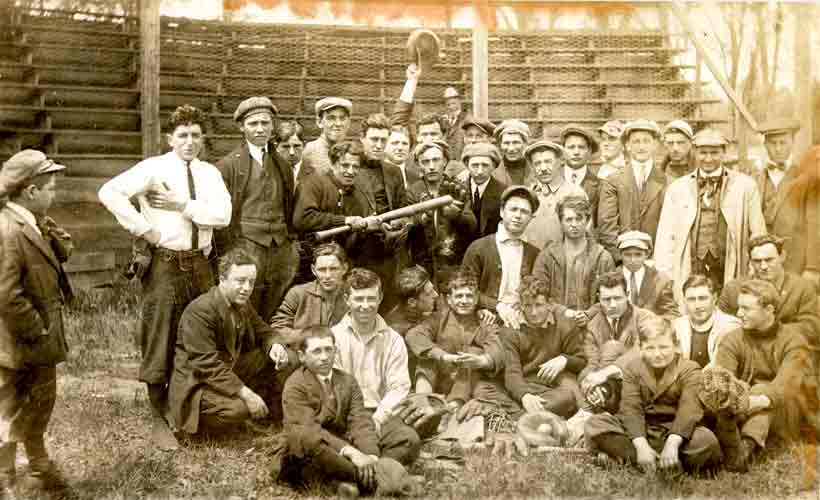

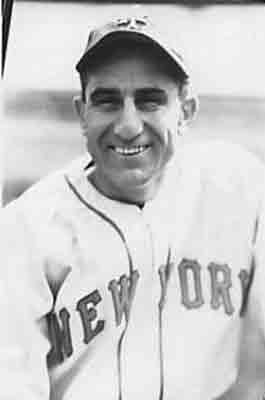
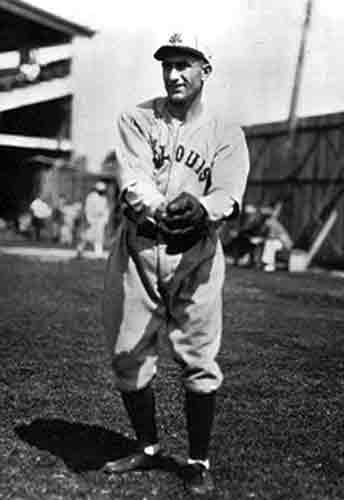
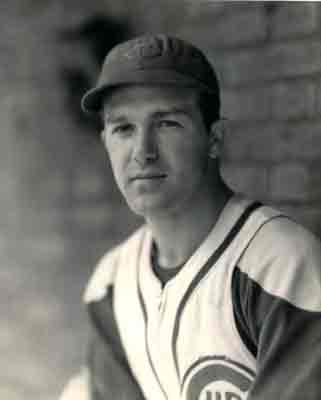
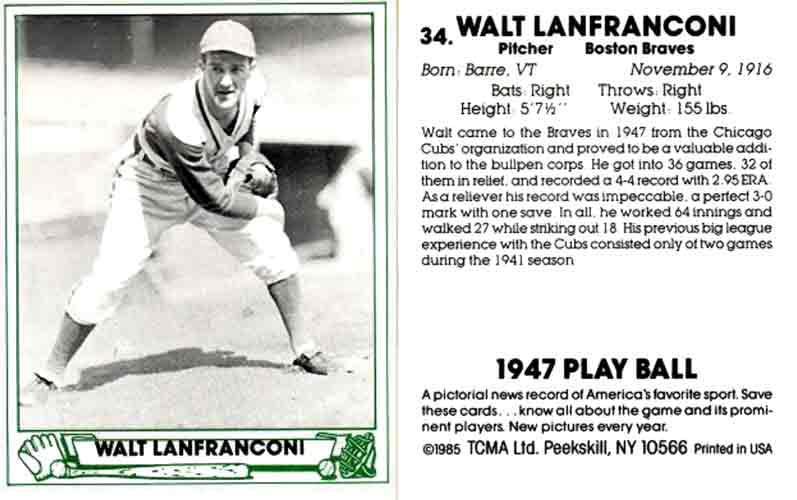
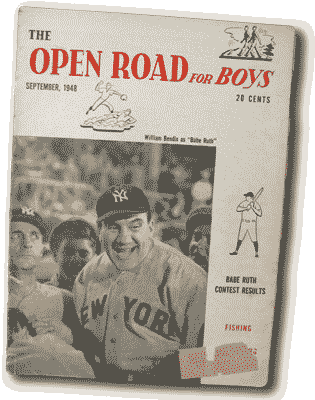
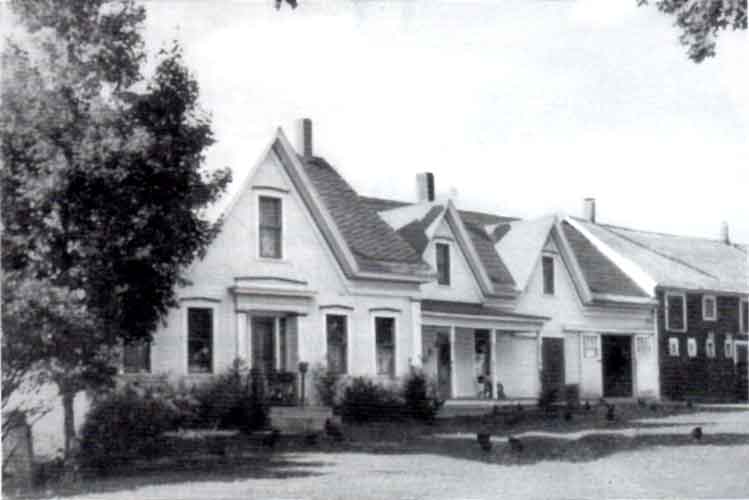

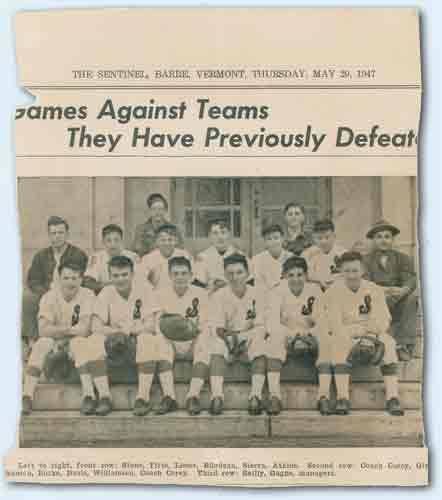
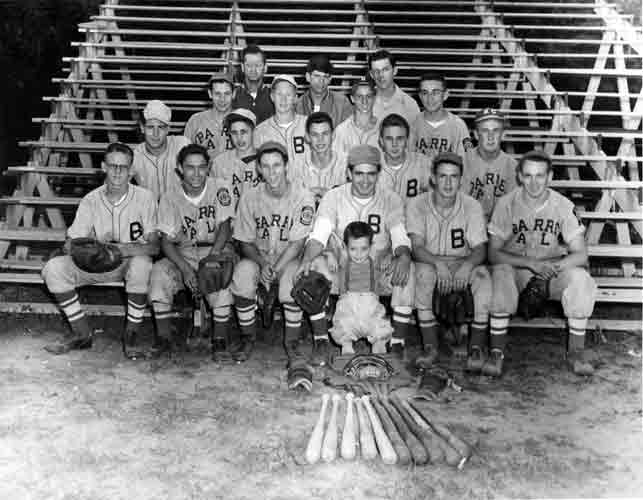
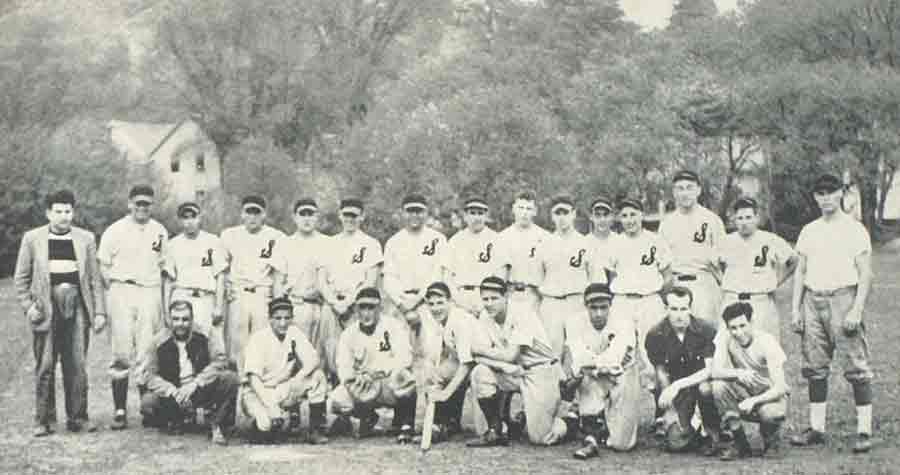
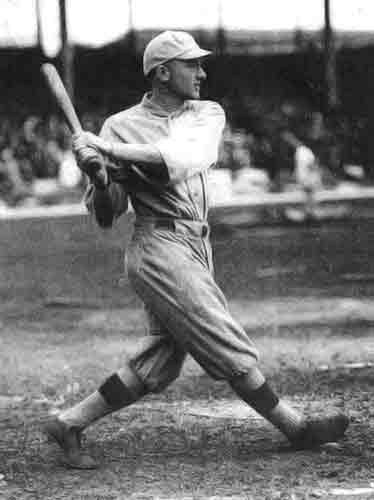
Baseball was a subject on everybody’s mind when I was a young man in Barre. If you look at some of the old Barre history, you see that they had local teams playing right here in the city, I guess, going back to the turn of the century. Of course at that time, there was more than one Italian club. Today there is the Mutuo Soccorso, but at that time, there were several Italian clubs. Barre had an active labor movement, and one of the reasons people have suggested is that whenever there was a strike, they were able to play ball.
The team that sticks in my mind historically was a team called the Barre Americans. I think that was in the 1930s, and prior to that there were a number of baseball teams, most of them probably attached to one or another of the social clubs or insurance societies or whatever you want to call them. But the Barre Americans sticks in my mind. And I think they probably played up toward South Barre, up where the high school was. I’m not sure of that. I do know that there was a ball field behind the church where the Saint Monica’s school was. The local Catholic high school was built there on that field. But when I went into high school and joined the baseball team, that’s where we played. That was the best ball field in town. It wasn’t much, I tell you. It was a skin diamond, very little grass. And what was interesting thing about it: if you stood up on the hill by a corner of the auditorium field you’d be looking down as into a great amphitheater. The batters would swing and hit the ball, and you wouldn’t hear the contact of the ball for seconds, of course, because of the distance and the height, which is sort of interesting.
After the war baseball became a preferred leisure of sorts, I guess you’d call it. Many of the clubs—that would be the Knights of Columbus, the Elks Club, and the Mutuo and one or two others—formed what was called the Industrial League around 1945 or ’46. And that was pretty good baseball, actually. A lot of the fellows were coming back from time in the service. Some had played ball during that time. Many of them were former athletes of Spaulding High School, of course. And that league did very well.
Initially, we played, as I say, behind the Catholic Church. Later they built a ballfield right near the auditorium, which has since been done away with the hockey recreation program there. We had everything. They had uniforms. And they had umpires. We had a regular press box. Two or three guys were writing stories about the games. And the games would attract anywhere from, oh, maybe 200 to sometimes for 400 people, maybe. Maybe that’s high but I think that’s about right, especially during, during the end of year when things got close. They played after work. Most of those guys were working in the stone sheds, and they would come up around 4:30 and get into their garb, and we’d start playing ball about 5 o’clock. I think the games were seven innings at that time. As summer went on there was not enough light, and there were no lights of course.
We all had our teams. I played for several of them. I played for the Mutuo and the Elks and the K of C. And I can remember I played on the team that had Crip Polli, former major league pitcher who had played in Jersey City. In fact, he was on the Yankees a short time when Babe Ruth was there, and I think he ended up his career up in Nova Scotia. I may not have that exactly right, but he managed the team. He was quite a guy.
We had a guy in town named Walt Lanfranconi, another Italian guy, who pitched fairly well. He wasn’t a big guy. I bet he wasn’t more than 5-8. And he’d pitched some in the service, some in the minor leagues. And he got a contract with the Braves, the Boston Braves at the time. They later moved to Milwaukee. And the Braves were a team that we paid a lot of attention to. He didn’t stay there too long. But he stayed there long enough that the community organized together, and they bought him a 1947 Chevrolet–I think it was ‘47–and presented it to him. He later went to the minor leagues and then came back here and opened a filling station.
Usually it was a competition between the VFW and the Mutuo as to be the top team, although it didn’t always work out that way.
Two things happened after I played there 4 or 5 years. The first thing that happened, television was invented and people who used to come out to watch a ball game at night stayed home and watched television. Secondly, all these guys that came back from the service formed families. They had children, and the children, in turn, began to play in Little League and later Babe Ruth League. In fact, I coached one or two years of Babe Ruth League.
My first introduction to baseball was through a magazine known as The Open Road for Boys, which was similar to Boys Life, which were the two magazines that young people used to get in those days. And I read a serialized story, “The Kid from Tomskinville,” I think the name of the story was. I can’t think of the guy’s name who wrote it. At any rate, he wrote the story of this young man who came up as a pitcher with the Brooklyn Dodgers and hurt his arm and later became an outfielder for the Dodgers. And this story sort of hooked me on baseball.
At the same time, my father had bought a farm up on East Hill, and I was able to get, on the radio, WHN, New York, AM, on any night, and most days, when it wasn’t too cloudy or bad reception was in the air. So we had a big old radio in the living room of this farm, and rather than getting in the back of the hay truck, whenever possible, I would slip into the house and listen to the ball game and did so whenever they played at night.
Alone up on the farm, three miles outside of Barre doesn’t sound like very much. But three miles in those days was a long way from all the friends I had to play ball with or play catch with, so I fashioned games of my own. I had a system whereby I would throw a ball up on the roof and it kind of went down in one channel and then over onto a second roof and then to the ground. And I learned how to short-hop a ball that way probably better than anybody else around in those days.
And I’d make up another game where I’d throw the ball against a barn door and field ground balls. And then later I got another game where I would take, usually just a stick and hit stones. I got so I could hit stones over the barn. Since I didn’t have any opponent, I won most of those games. That was baseball to me.
So when I actually got to see a real baseball game, that was a pretty much a big deal. I’m trying to remember when that was. Certainly the first professional game I saw was in St. Albans when the Montpelier Senators, as they were known then, traveled to St. Albans and played the St. Albans Giants. And I remember, my father lent one of his cars to a friend of his, and I and a couple of other kids, and this gentleman took us up through. We went through Smuggler’s Notch to get to St. Albans. And that was a big deal. St. Albans had a beautiful ballpark in that day which they since moved. It was right in the downtown, where baseball belongs, not out in the country.
I played baseball myself for 4 years in high school. I was a skinny kid, and I was going to play shortstop, or I wasn’t going to play. But I made the team the first year and played and went on trips around the state. We’d play other high school teams, and, boy, I thought the world couldn’t get any better than this.
We had a coach by the name of Eddie Casey. Eddie Casey was an ex-marine who taught, allegedly, modern history. Mostly, he read us a chapter, occasionally, and told us the rest of the time to read quietly to ourselves. And Eddie Casey was also a part-time football coach as well as baseball coach. And I made the freshman team and made the team for four years after that.
Casey was of the old school. He caught me swearing one time and threatened to tell my father. And I was scared to death. But he didn’t. I was a mouthy little fellow at that age, maybe because I was smaller than everybody else, or I thought I was. I remember, it was probably in my second year, my sophomore year. I didn’t show up for practice one day, and he says, “Where were you?” Well, the truth of the matter was I’d gone skiing in New Hampshire in Tuckerman’s Ravine, which I thought was a legitimate excuse. He didn’t say all that much, but he had me go out to shortstop. He wanted to hit me some ground balls, and he hit me every ground ball he could. He’d nail it so that it would come at me between the short hops. I never got a good bounce. He put a right-hand spin on the ball. He put left-hand spin on the ball. He’d holler at me when I didn’t get them, which was most of the time. Ran me back and forth. I didn’t realize I was being chastised at the moment. I thought I was supposed to be able to catch these balls.
I remember we were playing Randolph one time. One of the heroes of the team was Yiyo Sierra. He was a three letter man. He was terrific in all sports, not especially baseball. But he was good at baseball too. We were losing to Randolph, and everybody seemed to be taking strike 3 with a bat on their shoulder. So Casey said to the next hitter, he said, “The next guy that goes up there and strikes out with a bat on his shoulder, I’m going to break a bat over his head.” I don’t think teachers say that anymore. Wouldn’t you know it, Yiyo goes up there, and the umpire calls strike 3 on a pitch that was questionable but probably was a strike. Casey looks down. He says, “Well, hell, that one was outside,” and forgot that he had promised to break a bat over Yiyo’s or anybody else’s head (laughs). But that was kind of how he operated. We had other coaches but I always remembered Eddie Casey, for good or evil.
I went on to college. I played ball at UVM. I made the freshman team but I didn’t start. I made the team as a backup infielder and outfielder. I played the outfield once. I think I got one chance and dropped the ball. The second year I made the team. And the captain of the team was a shortstop, so I figured: here I am; I’m gonna be back-up shortstop. But the shortstop was made captain of the team. Well, he didn’t get a hit in the first seven or eight games. So finally they put me in it at shortstop. Well, they put me in as a pinch hitter, and I got the best base hit I ever got (laughs)–nice line drive out to left field, you know. Almost got a double but stayed at first base and felt that I was a hero. I was surprised I hit the ball; I was so nervous (laughs). All but the last game, I played the rest the games at shortstop. Did okay. Didn’t hit particularly well, but, you know, we weren’t a great ball team.
But coach [Larry] Gardner, that was his final year as coach of UVM. He came from Enosburg Vermont, Enosburg Falls, I think, and I don’t know where he played minor league ball, if he indeed did, but he played as I say for the Red Sox for seven or eight years. And three of those years, they won world championships. He hit something like 290. And his fielding average wasn’t bad. And when you think of the fields they were playing on and the gloves they were using, I’m surprised anybody could get a fielding average they’d even admit to. And Gardner always had a story about Babe Ruth and his ladies and his booze and about everything else he did that excited people (laughs). He never campaigned to be in the Hall of Fame. He wouldn’t care. But he sort of liked me. And that was good. That’s why I was able to make the team, I guess.
After that the next year some things had happened. My mother had died. I had a lot of stomach trouble, so I didn’t play any more baseball at UVM after that.
